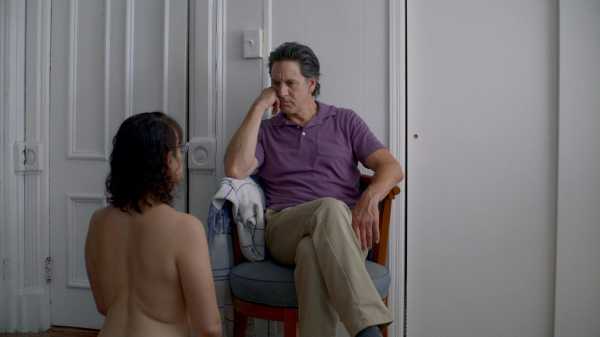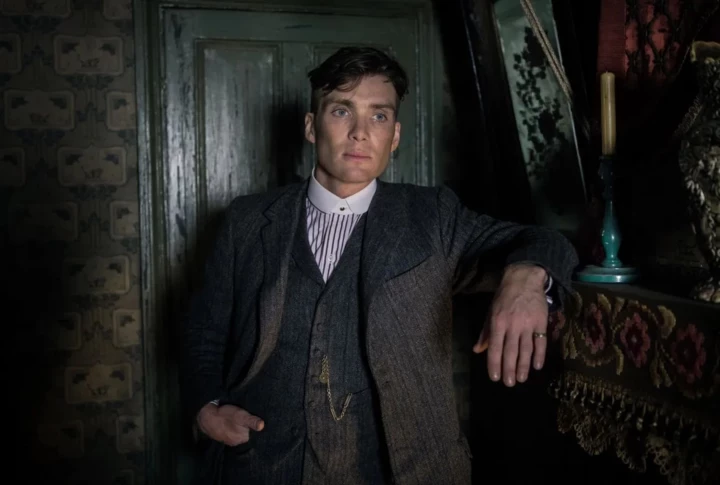
Save this storySave this storySave this storySave this story
A decade ago, thinking about a pair of independent films more than a generation apart—Claudia Weill’s “Girlfriends” (1978) and Alex Ross Perry’s “The Color Wheel” (2011)—I was struck by how much their delicate blends of comedy and drama owed to the directors’ senses of distance, their discerning choices about how far from the actors to place the camera. The Brooklyn-based filmmaker Joanna Arnow displays a similar art of distance in her first dramatic feature, “The Feeling That the Time for Doing Something Has Passed,” but to exquisitely and agonizingly different effect. (The movie, one of the outstanding offerings of last year’s New York Film Festival, is being released this Friday.) Arnow, who wrote and directed the movie, also stars in it as Ann, a thirty-something Brooklynite whose private life is centered on a submissive sexual relationship with a somewhat older man named Allen (Scott Cohen). It’s an unabashedly sexual movie, and its most provocative episodes are acted out by Arnow herself. Yet the precision with which she places herself in the frame, her careful calibration of the relationship of image to performer, enables her to sublimate Ann’s conflicts and vulnerability into a sort of spiritual exaltation.
Ann’s desire to be dominated appears to be less about the physical effect of pain or bondage than it is about humiliation. In the first scene, she’s naked in bed, lying on top of a blanket under which Allen is sleeping, and rubbing herself against his inert body as she expresses appreciation for the way he ignores her pleasure. It turns out that Allen is awake, but just ignoring her. She says, “I like how you don’t care if I get off, because it’s like I don’t even exist,” and he responds, “Can you not?” In short order, the movie runs through a gamut of humiliations and abnegations that Ann endures in other aspects of her life. In her relationship with her parents—played by Arnow’s actual parents, Barbara Weiserbs and David Arnow—Ann faces a minefield of passive and active verbal aggressions that stifle her good intentions and attribute bad ones to her. She has a dull job in something vaguely technical and educational, at a company where her main responsibility is to make her own job obsolete. A sense of nonexistence is enhanced by a strikingly simple dramatic ploy: Ann’s name isn’t even heard until a half hour into the film. Even trivial moments of her life threaten abysses of humiliation—the color and texture of the gloppy brown food that she squeezes from a green packet into a bowl, the response to an introduction at a party (“We already talked to her”), the skeptical glance of a classmate at yoga.
Ann seeks an emotional connection unavailable in her relationship with Allen and spends time on dating apps looking for someone else. The prescribed roles of erotic play and the actual identities of the participants playing the roles collide in destabilizing ways. When Allen gags Ann, he expresses delight that he won’t hear her talk. She later says that his remark made her sad because she thought he meant it—and he says that indeed he did. But when Ann tries to be dominated by another man, he’s too mild and needs instruction from her—a contradiction, of course. A third man proves too wild, his cruelty coming to the fore; he tries to make the humiliations he inflicts public, and he’s impatient with her request for the usual practice of post-B.D.S.M. aftercare. And when Ann is with men who don’t seek to dominate her, she lets loose with an unrestrained sentimentality that yields other, self-inflicted humiliations.
In many of the scenes where Ann’s body is exposed, her chosen masters’ dictates turn the constraint that she seeks into a sort of choreography. Allen orders the naked Ann to run to the wall, run back and suck his nipple, then run to the wall again; though the action is sexual, the impression left is one of absurd arbitrariness. Arnow’s starkly purposive style of movement is reminiscent of dances by Pina Bausch, and this effect is achieved not only in how she moves but also by the way that she is framed by the camera of the cinematographer Barton Cortright. The distinctive aesthetic involves a finely calibrated relationship of body and image, and it is achieved by two kinds of distance: the physical distance of the camera from the actors and a canny use of lenses’ focal lengths to evoke the spaces the characters inhabit. The movie has relatively few closeups. Ann is seen walking or sitting or lying down in rooms that, however cramped, seem like empty expanses. In the street, she’s seen walking and talking (on the phone or in person) from far away, while the talk is heard as if from nearby, in intimate proximity.
As obstinately and forthrightly physical as the movie is, it also intensely and superbly verbal. Scenes of dialogue are often shot from a delicately theatricalized distance and at subtly disorienting oblique angles. The effect is to thrust language into the foreground, to the point where it comes to feel almost more tangible than the bodies. The word is made flesh, while flesh—however much displayed and discussed—seems etherealized. Characters speak with a slightly hyperreal precision, their meanings and feelings conveyed by minute inflections of rhythm, timing, word choice, and emphasis. It is as if Arnow’s direction had etched the script onto the screen. (As I watched, I found myself frequently noting not just turns of phrase but what sounded distinctly like italics.)
I don’t know how precisely Arnow’s scriptwriting or direction dictates inflections to the cast, but the entire cast talks and moves like Arnow, as if she had somehow molded them by hand. Arnow recognizes that much of life’s pain is built around sharp yet minor intimacies, impressions, and humiliations, and she brilliantly captures the sense of disproportion that arises when slight or banal exchanges have mighty emotional effects. Even moments in which drama is almost nonexistent somehow brim with concentrated intensity: a subway-platform display declaring that the next train is in twenty minutes; a friend forcing Ann to listen to a song that she asked him not to play. The deceptively plain style calls to mind Jacques Tati, a great director and also a great mime whose singular screen presence in his own movies is inextricable from the exactness of his direction. Likewise, Arnow’s poignant and original performance—refined in its awkwardness, exalted in its degradation, touched with grace in its rude self-presentation—is a double masterwork of acting and directing. ♦
Sourse: newyorker.com







